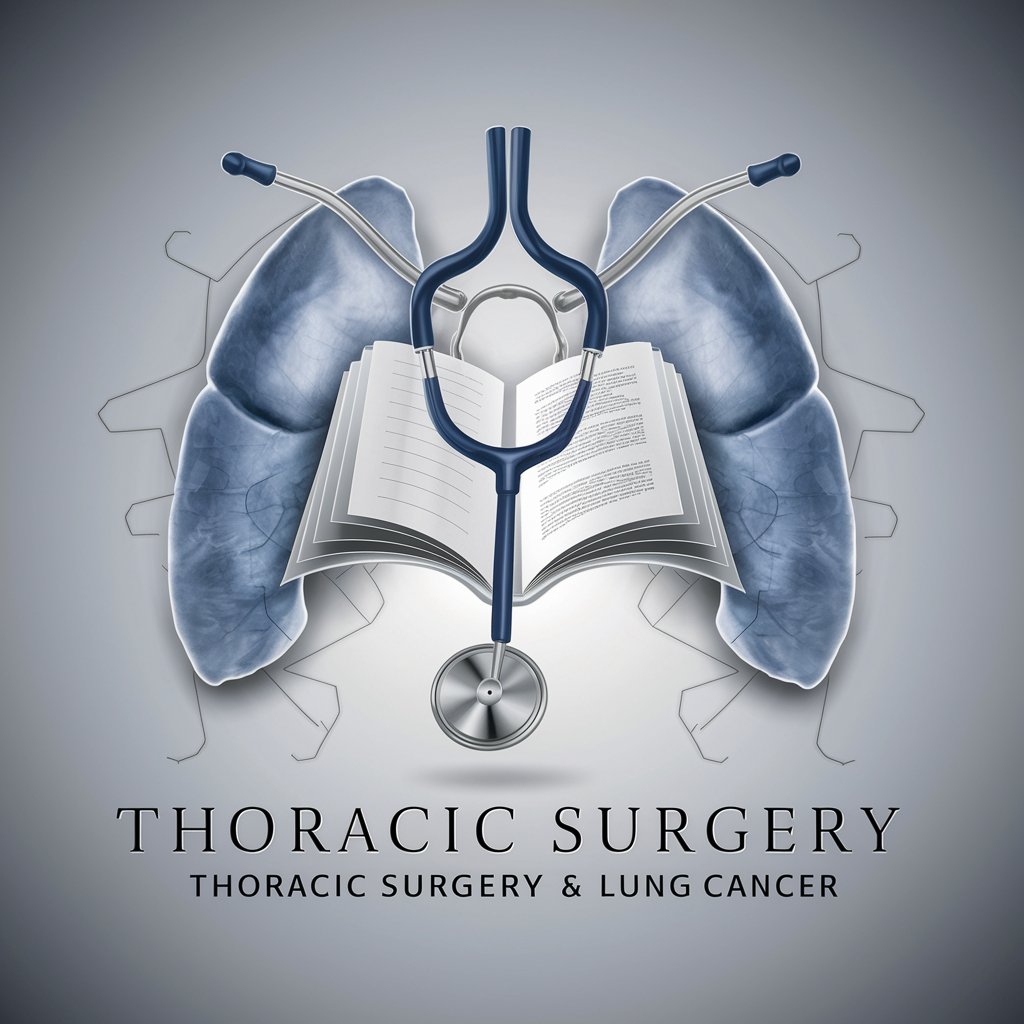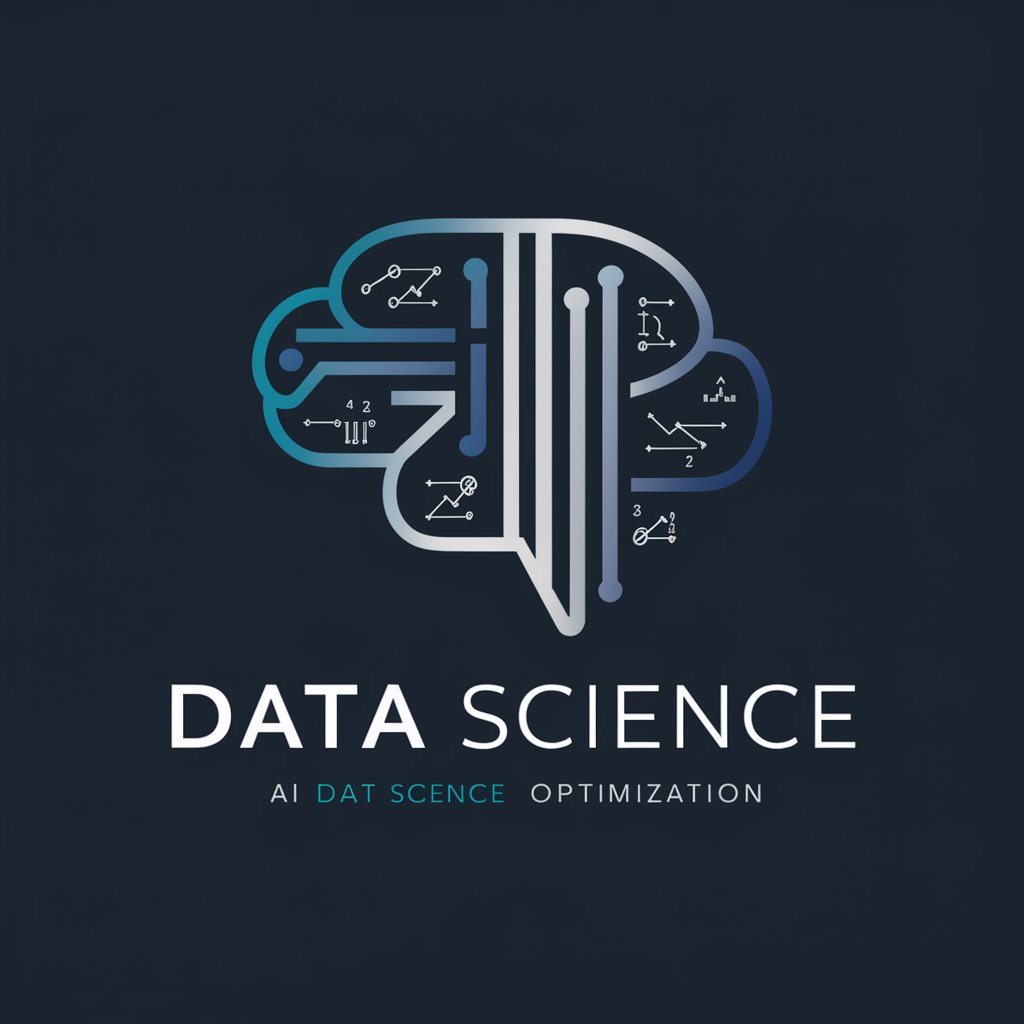4 Thoracic Surgery - Thoracic Surgery Insights

Welcome! How can I assist with your thoracic surgery or lung cancer inquiries today?
Empowering thoracic care through AI
Analyze the latest advancements in thoracic surgery techniques and their impact on patient outcomes.
Summarize the current trends in lung cancer research and potential areas for further investigation.
Interpret clinical trial data on new treatments for non-small cell lung cancer.
Discuss the role of minimally invasive surgery in the management of thoracic diseases.
Get Embed Code
Overview of 4 Thoracic Surgery GPT
4 Thoracic Surgery GPT is a specialized artificial intelligence model tailored for the domain of thoracic surgery and lung cancer. Designed to serve as an expert assistant, it integrates a wide range of medical knowledge, focusing primarily on thoracic surgical practices, lung cancer diagnosis, treatment options, and postoperative care. The purpose behind its creation is to offer academically rigorous responses, analysis, and synthesis of information derived from extensive medical sources. Through its capabilities, it assists in interpreting complex medical data, identifying trends in thoracic surgery, and providing suggestions for research directions. Examples of its application include aiding in the drafting and structuring of research papers on thoracic surgery topics, offering detailed explanations of surgical procedures, and discussing the implications of recent studies on lung cancer treatments. Powered by ChatGPT-4o。

Core Functions of 4 Thoracic Surgery GPT
Data Analysis and Research Synthesis
Example
Analyzing trends in lung cancer treatment outcomes based on recent studies.
Scenario
A medical researcher is examining the efficacy of minimally invasive surgical techniques in lung cancer treatment. 4 Thoracic Surgery GPT processes and synthesizes data from various studies, presenting a comprehensive analysis that aids in understanding the impact of these techniques on patient recovery times and survival rates.
Research Paper Assistance
Example
Structuring and formatting academic papers according to medical journals' standards.
Scenario
An academic is preparing a manuscript on the role of robotic surgery in thoracic procedures. The GPT offers guidance on structuring the paper, incorporating the latest research findings, and ensuring the manuscript adheres to the submission guidelines of targeted medical journals.
Educational Support
Example
Explaining complex surgical procedures and treatment protocols in an accessible manner.
Scenario
A medical student is struggling to understand the nuances of video-assisted thoracoscopic surgery (VATS). The GPT breaks down the procedure step-by-step, including the indications, technique, and postoperative care, enhancing the student's learning experience.
Target User Groups for 4 Thoracic Surgery Services
Medical Researchers
Researchers focused on thoracic surgery and lung cancer can leverage the GPT for data analysis, literature review, and assistance in preparing research papers, proposals, and grant applications. Its capability to synthesize complex medical data into coherent analyses makes it an invaluable tool for advancing research projects.
Healthcare Professionals
Surgeons, oncologists, and other medical professionals involved in the treatment of thoracic diseases may find the GPT helpful for staying updated on the latest surgical techniques, treatment protocols, and clinical guidelines. It serves as a resource for continuous learning and for enhancing patient care strategies.
Medical Students and Educators
Students and educators in medical fields benefit from the GPT's detailed explanations of surgical procedures, disease pathology, and treatment rationales. It supports education by providing up-to-date information and facilitating the development of critical thinking skills in clinical scenarios.

How to Use 4 Thoracic Surgery
1. Begin with a trial
Initiate your journey by visiting yeschat.ai to explore 4 Thoracic Surgery without the need for signing up or subscribing to ChatGPT Plus, offering an accessible entry point for all users.
2. Identify your query
Consider the specific thoracic surgery or lung cancer information you need assistance with. This clarity will help in framing precise questions for more targeted and effective responses.
3. Ask detailed questions
Pose your questions to 4 Thoracic Surgery, providing as much context and detail as possible. This enhances the accuracy and relevance of the responses you receive.
4. Utilize provided resources
Take advantage of the comprehensive knowledge base, including academic articles, research data, and surgical guidelines, to inform your inquiries and deepen your understanding.
5. Apply insights responsibly
Implement the insights and information in your academic, professional, or personal health contexts, always in consultation with qualified healthcare professionals when making clinical decisions.
Try other advanced and practical GPTs
Optimization Methods
Empower Decisions with AI-driven Optimization

托福写作批改神器
AI-Powered TOEFL Writing Enhancement

オネエのお部屋
Engage with AI, Onē-style!

写部门月报
Streamline Reporting with AI

Fitness & Martial Arts Sales Master
Enhance your sales with AI-powered strategies

Sensei Martial Arts
Master the Art, Powered by AI

5歳児
Engage kids with AI-powered chat.

Mom's Compass
Nurturing Tomorrow's Brilliance, Today

Career Compass
Empowering Your Career Journey

Invoice & Receipt Organizer
AI-driven invoice and receipt organizer.

FP(ファイナンシャルプランナー)技能検定【最短合格】3級 模試トレ
AI-driven FP Certification Preparation

MJ Prompt Generator V6
AI-powered prompt generator for artists
Frequently Asked Questions about 4 Thoracic Surgery
What types of questions can I ask 4 Thoracic Surgery?
You can inquire about a wide range of topics related to thoracic surgery and lung cancer, including diagnosis techniques, surgical procedures, post-operative care, latest research findings, and data analysis.
How can 4 Thoracic Surgery assist in academic research?
It can provide assistance in structuring and drafting research papers, offer guidance on data analysis, identify trends in thoracic surgery, and suggest areas for further research, all while adhering to academic standards.
Can 4 Thoracic Surgery provide medical advice?
While it can offer detailed information and insights on thoracic surgery and lung cancer, it is designed to support education and research and should not replace professional medical advice or clinical decision-making.
Is 4 Thoracic Surgery suitable for professionals already in the field?
Yes, it is an excellent resource for professionals seeking to update their knowledge, access the latest research, and apply data analysis in their practice or research in thoracic surgery and related fields.
How accurate is the information provided by 4 Thoracic Surgery?
The tool strives for high accuracy by synthesizing information from a comprehensive database of academic and medical sources. However, users are encouraged to consult original sources and professionals for clinical decisions.
